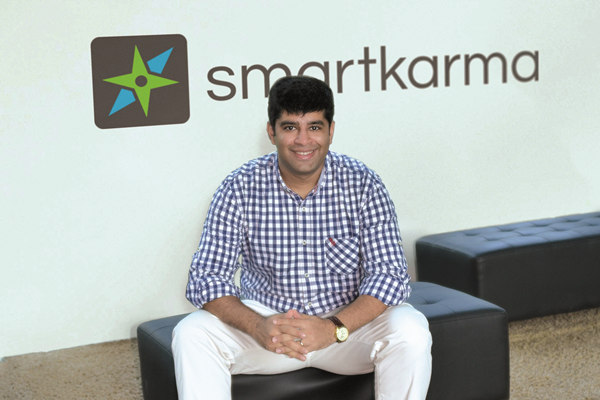Reinventing finance
 |
|
RAGHAV KAPOOR, cofounder and CEO of Smartkarma, says he is dedicated to delivering positive change to the finance industry. PROVIDED TO CHINA DAILY |
Singapore-based cofounder of a platform for investment research is making moves to revolutionize the industry
Raghav Kapoor delivered a presentation at Singapore's TradeTech Asia 2016 in October entitled: Reinvention of the traditional finance sector - What if you could do it all again?
Arguably, there could be no better person to speak on the topic. Kapoor is cofounder and CEO of Smartkarma, a Singapore-based financial technology, or fintech, startup dedicated to delivering positive change to the finance industry - on a scale that could usher in a new order.
"We are Asia's largest collaborative research marketplace," explained Kapoor, who is originally from India and now a Singapore citizen.
Indeed, Smartkarma is playing a crucial role in the evolution of the investment management and research industry, in hopes of attaining "efficiency, transparency and a whole new economic model".
In short, the startup seeks to replace banks' research teams and become the sole provider of information and data to asset management companies.
"Our business model is similar to what Netflix and Spotify do," said Kapoor of the US online streaming services for TV shows and movies, and music, respectively.
"There is a central marketplace and the consumer pays a single subscription, so they know upfront and in advance how much it will cost, and this will give them access to all the research on Smartkarma."
His focus on transparency is particularly pertinent, because that is also the direction of the push by the finance industry's regulators. Specifically, it is a response to a ruling known as the Markets in Financial Instruments Directive, established by European policymakers in the wake of the 2008 global financial crisis.
"In the past, the finance industry had no pricing or fee structure. Everything was done in a black box. But with the directive's focus on transparency, it is now necessary for buyers to have a detailed breakdown of any services they procure, as well as to justify the cost," said Kapoor.
The same applies for the purchase of research - something which traditionally did not have a fixed price.
Spotting a gap in the market, Kapoor leaped at the opportunity. He and cofounders Jon Foster and Lee Mitchell spent six months "detoxing" themselves of finance.
The result was their decision to take the Netflix route. Smartkarma's clients - both institutional and, in the near future, retail - pay a monthly or annual flat fee for access to research on the platform.
Since launching in 2014, the service boasts more than 1 million insight views, over 90 contributing firms and upwards of 140 active institutions. "We are now four times the size of the biggest bulge bracket of banks in terms of research on our platform," said Kapoor.
But there is more. Given its digital nature, Smartkarma can track which research providers are adding the most value for clients.
Analytics on the platform allow Kapoor and his team to see who is reading what, and help clients better customize their experience while navigating the platform. Users can also save articles for reading later, and engage researchers in discussion.
On the supply side, Smartkarma has the infrastructure to help data analytics companies share their findings.
For instance, there is a company that predicts how well a movie will do, right down to its opening weekend box office.
"We can help the data science people distribute their analysis," Kapoor explained. "If there is a movie by a publicly listed production house that is going to do well, the funds can then consider buying its stock ahead of the film's opening."
Kapoor, 34, spent less than a decade in the finance industry before starting Smartkarma. He believes that gives him an advantage.
"Because I wasn't in the industry for very long, I did not get used to its practices. This allowed me to quickly identify the opportunities, particularly when the regulators start wanting more transparency and change."
Born and raised in Chandigarh in northern India, Kapoor comes from a middle-class family of academics who had "zero knowledge of investment".
At 15, his parents urged him to apply for the prestigious Singapore Airlines Youth Scholarship, which selected just 30 students from India to go to Singapore.
"They wanted me to have exposure to a different education system," he said.
Kapoor was in the city-state for two years before winning another scholarship, from the then Port of Singapore Authority, to study at the University of Cambridge in the United Kingdom, and later, Stanford University in the United States.
It was only when he had completed his studies, and after a stint at consulting firm Oliver Wyman in London, that he found he wanted to return to Asia. He landed a job with banking giant Citigroup selling highconviction research ideas to global hedge funds.
"It was tremendous learning for me. Investing was not in my blood; I had not looked at Asian markets but had the opportunity to work with top fund managers and companies."
He stayed at Citibank from 2006 to 2009, before joining Aviate Global, a boutique-sized brokerage firm, as a partner. The business grew steadily and in two years it had made $30 million in revenue "in a time when the bigger banks were in disarray".
Kapoor and his partners sold off Aviate and he worked with its new owners until 2014 before starting Smartkarma.
While immersed in the world of finance, Kapoor witnessed the global financial crisis of 2008 and also watched as the scandal unfurled over the Ponzi scheme of Bernie Madoff, which defrauded thousands of investors.
"It made me realize that asset management is not as clean as I had thought," Kapoor said. "Each time a scandal surfaced, new regulations would be formed and changes to the industry would be accelerated.
"I felt that the way business was being done in capital markets will dramatically change, and felt the calling to participate in this change, to lead it and help it evolve to a whole new level. This was the genesis of Smartkarma."
In August 2015, Smartkarma signed a global agreement with Morningstar, one of the world's largest independent investment research companies, to distribute research through its platform.
Then in June last year, Smartkarma successfully raised another $4.7 million, bringing its total funds raised to $7.5 million.
"We told our potential investors one thing: 'We're here to make change, it's going to take time, we're going to be strong, bold and confident and we're going to fight. We're not in here to make a quick buck.' And they get it."
Looking ahead, the company has its gaze fixed firmly on North Asia. In October it opened its Hong Kong office, which will support its strategic plans in the Chinese mainland, where Smartkarma is in talks with financial institutions.
However those plans might unfold, Kapoor's overall vision for the business will remain a constant.
"We want to have a lasting impact and fundamentally change how people do investment research," he said.
"Good insight sits at the center of investing, otherwise you're just punting. If you want to punt, go to a casino."
















